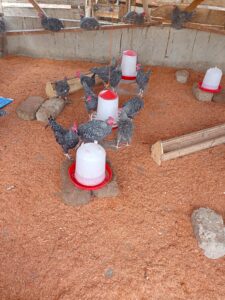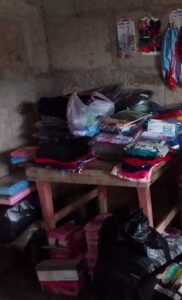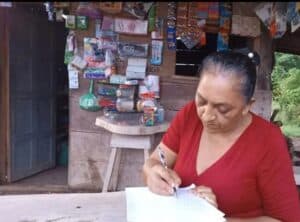Hatching New Ideas: The Young Entrepreneur from La Rampla

A young entrepreneur & families attend training
This year, we started our training sessions early at the Fred Strohbehn Training Center in Nicaragua to get a head start with the growing demand from communities. We held the first session on January 27th, with 23 locals from nearby communities participating. Among them for the first time, was a larger-than-normal attendance of children who tagged along with their mothers. The mothers were eager to learn about the micro-credit program, but also about us introducing our new pilot project with raising chickens, but many didn’t have anyone to watch their children at home.
In total, about nine children were sitting by their mother’s side, swinging their shoes back and forth as they sat in chairs listening to Self-Help’s staff introduce business training and information about the program. We shared the results and success stories of many women from 2016, which peeked interest even further. After receiving a few hours of program-packed knowledge through visuals, handouts and lectures, locals left filled with hope, motivation, and were eager to participate in the new program.

Mother and daughter working together
On February 1st, we had our second meeting at the Fred Strohbehn Training Center. This time, we held a separate training session only on the micro-credit program, due to the high demand of the new project we would be implementing with the newborn chicks. The women in the micro-credit program brought along their children, grandchildren, nephews, nieces, and cousins. Micro-credit program officer Yolanda Fletes, and I, taught the children and mothers how to properly raise chickens at home. We taught each participant and family member, the benefits of taking care of the animals, how to properly feed them with QPM seed, and how they could generate additional income for the family by selling them when they are fully grown.
We decided to focus this training session on promoting the interest of raising chickens to the children, so they could learn to love and care for animals. We wanted to involve them in a positive and constructive way, that would allow them to follow the footsteps of their parents in improving their quality of life at home. Most of the children assured our staff that they were already going to start building their new feathery friends some homes out of scrap wood and sticks.

Ready to work together on the new family business!
I was taken aback when I heard from one of the children – a 12 year old boy named Carlos, about his future plans. He lives in the community called “La Rampla” (located about 45 kms from the SHI office). He boasted that he had already built a shelter measuring 3×3 sq. meters, because he thought it would be a good business to be prepared, and then grow the business little by little. His father participates in our QPM program, and he said he could help his father plant and harvest the corn, so that he could feed the chicks with better seed. He told our staff, “I think I will take good care of my chicks, and then I will sell them. When I sell them, I will use that money to buy more chicks. Then, I can buy myself things and not have to ask my parents for money. I can also save for school.” He went on to to also thank us saying, “I know my father is part of this organization, and so is our family now, but I feel closer to you because I get to work with you myself. Thank you.” I smiled and let him know I looked forward to working with him.
On Friday, February 10th, the first set of chicks were delivered with their initial QPM seed to the families who participated in the training. We will be excited to see how this initial program grows. Our February training session about raising chickens saw a 33% increase in participation since our last one, due to more family members wanting to be involved. We are happy to watch our training center expand opportunities and programs as we identify the needs from the many different communities we serve. We look forward to welcoming more children like Carlos – young, innovative entrepreneurs, ready to help their family grow stronger.

Children participating in the new training session




